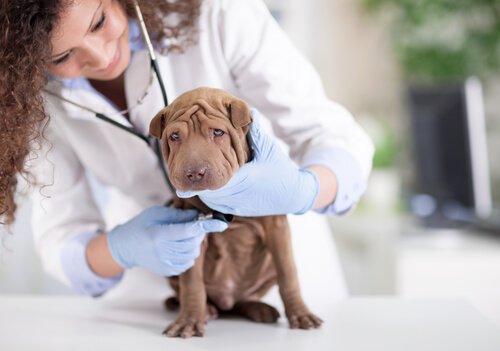Vaccines for Dogs: Side Effects of Vaccines


Written and verified by the lawyer Francisco María García
Although adverse reactions from vaccinations in your pet are rare, your pet might get a fever or hives. However, normally these reactions aren’t severe. Vaccines for dogs protect your furry friend against diseases, such as distemper or hepatitis. On the other hand, these vaccines can cause side effects, such as fever or allergic reactions.
Vaccines for dogs are meant to defend the animals against certain diseases. The percentage of side effects from vaccines for dogs is “very low” compared to the number of lives that this type of injections and treatments save each year.
Diseases and side effects of vaccines for dogs

Experts conducted a six-year survey in Japan of 311 vaccinated dogs. This survey showed that one of the injections that most frequently causes side effects in dogs is the rabies vaccine.
Some side effects of these vaccines include flu, allergies, and skin or respiratory conditions. However, in other cases, — even they’re not common — they can cause gastrointestinal damage or cold symptoms. On the other hand, in the most serious cases, damage can involve cardiovascular illnesses.
The most serious side effect from a vaccine is anaphylaxis. This adverse reaction occurs when the body reacts by attacking itself and destroying its own red blood cells to defend itself against the vaccine. Although this seems very alarming, it’s a side effect that occurs not so often.
Higher rates in young dogs
Side effects usually occur during the three days following the vaccination. In General, the effects go away on their own without treatment. Young dogs are more vulnerable, but specialists say that vaccines for dogs are safe.
There are many studies that show adult dogs under the age f seven have a greater risk of suffering these effects. Small breed dogs and neutered dogs were the most vulnerable to these reactions.
Safe vaccines
Despite this information, vaccines for dogs have been tested and approved. In addition, experts have documented the possible side effects that may occur. If a vaccine is recommended on the Official Vaccination Calendar, it’s because it has already passed the established quality controls and your pet’s health is guaranteed.
When adopting a puppy, most of the breeders and shelters deliver the animals with some vaccines. From there, the new owners have the responsibility of getting the remaining vaccines.
The most frequent and important vaccines
The most important vaccines are for distemper, parvovirus, hepatitis, leptospirosis, rabies, kennel cough (tracheobronchitis), piroplasmosis, and coronavirus.
Keep in mind that vaccines are a preventative measure that can save your dog’s life. Therefore, it’s worth spending your money on these measures. Nowadays, on the market, you’ll find different brands and types to choose from. In addition, each vaccine has a different quality and price. Consequently, it’s important for you to choose the right one.
How vaccines work
Vaccinations consist of injecting the animal’s body with a weaker version of the disease. The body and immune system detects it and starts to create defenses against it. However, these defenses aren’t always permanent in your pet’s body. Therefore, it’s sometimes necessary to give your dog a booster. because they allow the body to start to create defenses again.
Vaccine schedule for dogs

Experts usually advise to always follow the same immunization schedule. However, there are many factors that can influence programming these vaccines. Among the variables that may affect the schedules is the immune status of the puppy, the area where the puppy lives, the new family’s routines, etc. All of these factors can expose dogs to several diseases.
Therefore, it’s a good idea to consult with a veterinarian so that they can establish a calendar that adapts to the needs of your dog. Keep in mind that the sooner your dog is vaccinated, the sooner he can start socializing with other dogs and people. As for a specific timeline, we recommend you start vaccinations at 6 weeks old.
This text is provided for informational purposes only and does not replace consultation with a professional. If in doubt, consult your specialist.